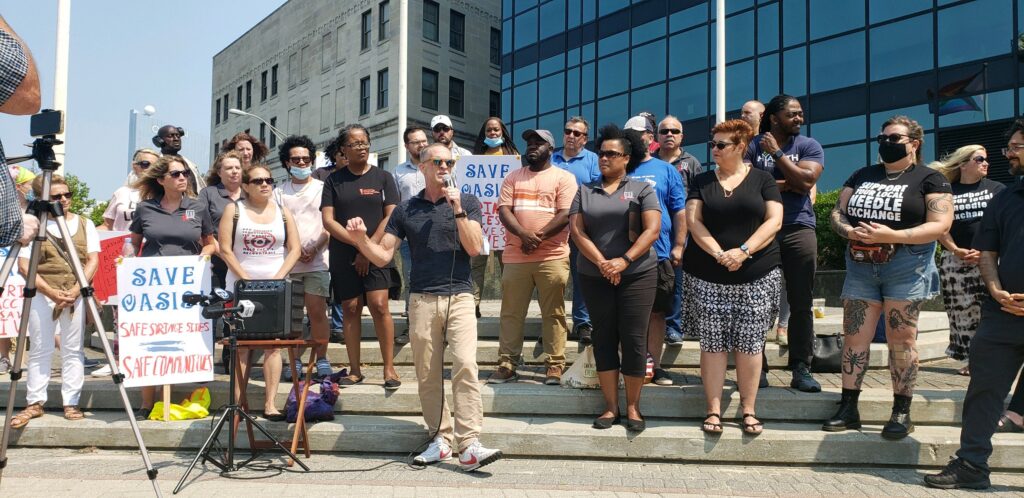A Safer Fix in Atlantic City (Part 2)

The coronavirus may have displaced the heroin crisis from the headlines and from the front of our minds, but America's addiction to opiates has only grown stronger. But instead of creating a climate where more drugs users can get help, Atlantic City democrats are basically kicking their heroin problems to the edge of town.
DRUG OVERDOSES
As COVID ran roughshod, claiming over 600,000 American lives in the process, our nation's appetite for opiates reached ever more insatiable levels. And now we've got the body count to prove it: roughly 93,000 Americans died of a drug overdose in 2020. Most of those deaths were associated with opiates like heroin, prescription drugs and fentanyl, a synthetic opioid that's roughly 60x more powerful than morphine. Amphetamine OD's also hit a new record.
That 93k figure roughly equals the population of Toms River, New Jersey's 8th largest town.
Let that sink in for a moment.
ATLANTIC CITY
Later this month, Atlantic City council will vote to close Oasis, a needle exchange site located on Tennessee Avenue about 3 1/2 blocks from the beach. AC's mayor and (most) of council seem poised to send Atlantic County's only needle exchange program off the island to a site that once housed the infamous Golden Key Hotel, a notorious flophouse where a notorious serial killer preyed on sex workers in 2006. And that's a problem because needle exchange must be cheap and convenient for it to actually work.
Why needle exchange? A clean syringe costs a quarter. A lifetime treatment for hepatitis comes with a $200,000 price tag, a burden we all share since (in most cases) IV drug users don't have the best insurance coverage.
The South Jersey AIDS Alliance who manage Oasis have proposed a new site behind the convention center that's "far enough from the casinos but still accessible to those who need it most because eduction saves lives. It also saves a lot of money not treating expensive diseases associated with drug abuse."
Last week, a coalition of Harm Reduction devotees gathered in Atlantic City (see pic) to support Oasis and urge a more robust embrace of harm reduction policies. Needle exchange, for example, limits the damage drug users do to their health while they’re out there using. Oasis is a point-of-entry for everything from wound care, HIV testing, lifesaving NARCAN, and drug treatment. It's a good investment and it keeps drug users out of our COVID-burdened hospitals.
This is God's work. You'd think local officials would venerate the staff at Oasis showering grace on the "least or thee" among us.
But no.
Jenna Mellor is co-director of the NJ Harm Reduction Coalition.
"Atlantic County has one of the highest overdose death rates in New Jersey," Ms. Mellor told InsiderNJ. "New Jersey's overdose deaths are on track to be worse than any year in state history. If Atlantic City moves forward with its proposal, people will die. Black and brown residents, women, low-paid workers, immigrants, and LGBTQ residents will suffer the most."
Garden State Equality's Christian Fuscarino echoed the sentiment.
“Studies show that upwards of 30% of LGBTQ-identified people abuse substances compared to only 9% of those who identify as heterosexual,” Mr. Fuscarino told InsiderNJ.”Every LGBTQ person should be outraged at any effort to remove a harm reduction center from our state and view it as a direct attack on our community."
It's election year and democrats like Phil Murphy and Sheila Oliver will be brandishing their pro-LGBTQ until November. All that proves is that it's easy to be an LGBT ally when the going's easy and the stakes are low.
So what about when the stakes are high and the path is fraught?
Like right now.
The Perils of NIMBY
Atlantic City officials, including Councilman Kaleem Shabazz have a valid point lamenting the uneven distribution of harm reduction sites in New Jersey. They're always in minority communities because that's how NJ's pilot needle exchange legislation (signed in 2006) was written: 6 needle exchange sites, all in urban areas with NJ's remaining municipalities given veto power over harm reduction expansion into their towns.
Any guesses how many municipalities rolled out the welcome mat in the meantime?
None have.
Not a single one.
“The question is not whether we support the needle exchange.” Councilman Kaleem Shabazz told AC Press." We have supported the needle exchange. The question is can we get our neighboring communities to help us with the drug crisis?”
Sadly, probably not.
You won't see leafy suburban town like Montclair and Cherry Hill on the harm reduction bandwagon anytime soon because (mostly while) municipal lawmakers won't have it.
And unfortunately, if AC lawmakers get their way, the city's IV drug using population has nowhere to access clean needles and (perhaps more urgently) nowhere to safely and easily dispose their syringe litter. That means more bio-hazardous waste in the community putting family members and first responders at greater risk for cross-contamination.
And that fills me with an incandescent rage that makes me want to light my hair on fire. Luckily, I know just who to call to coax me off the ledge.
New Jersey super-lobbyist Jeannine LaRue was born and raised in South Jersey. A former vice chair of NJ's Casino Commission, Ms. LaRue is uniquely acquainted with the tenuous fault-line where the bourgeois and the rabble collide.
"Councilman Shabazz is right,” Ms LaRue told InsiderNJ “ It’s not fair that places like Atlantic City are forced to shoulder the burden of New Jersey’s harm reduction needs. But it’s also not fair to abruptly put Oasis out of reach for those who need it."
There is a bill pending in the legislature that would expand harm reduction services to all municipalities and stop local councils from blocking lifesaving harm reduction services from opening in their communities.
Jay Lassiter is a former IV drug user living a charmed, hepatitis-free life in Cherry Hill.





